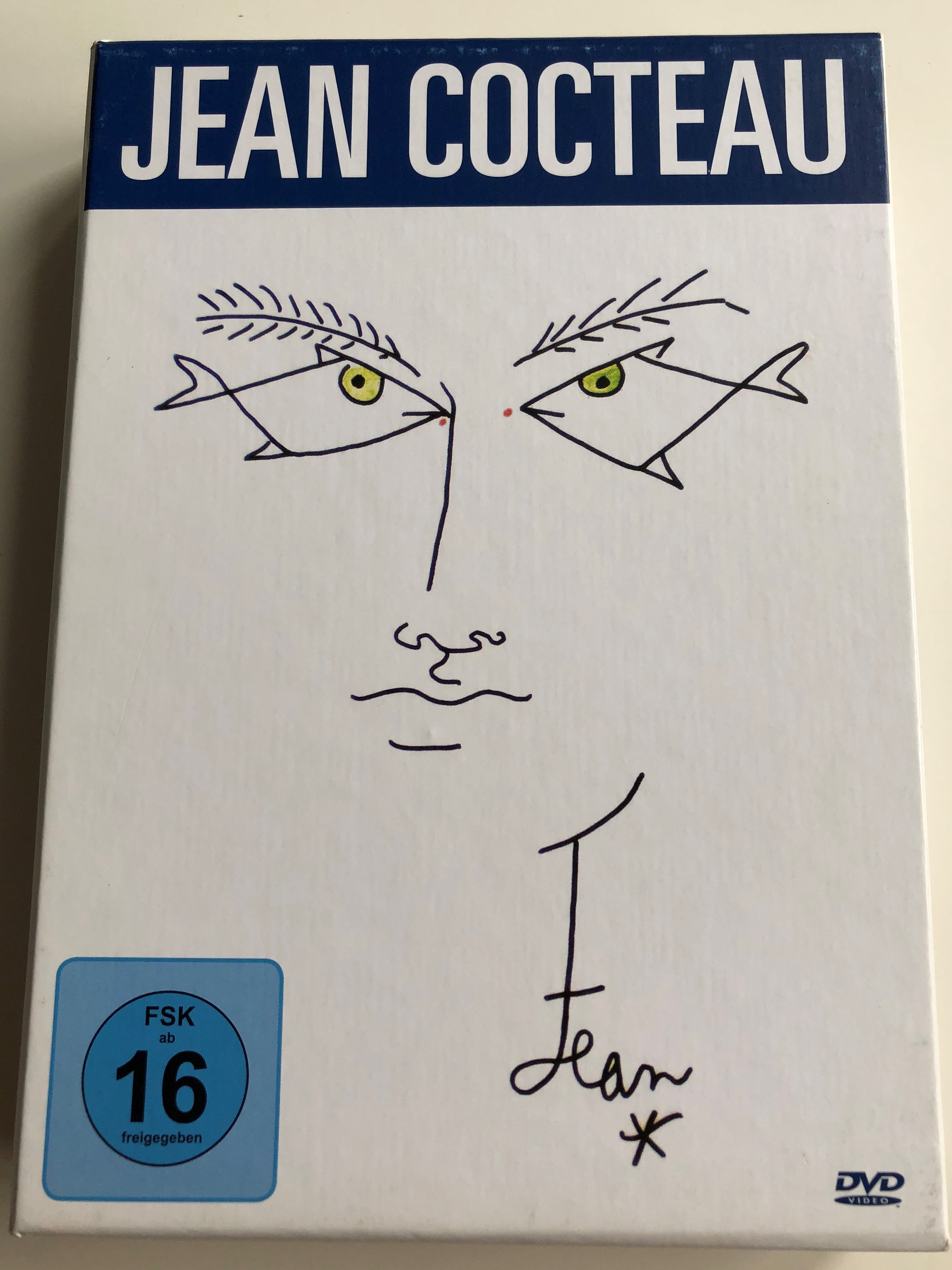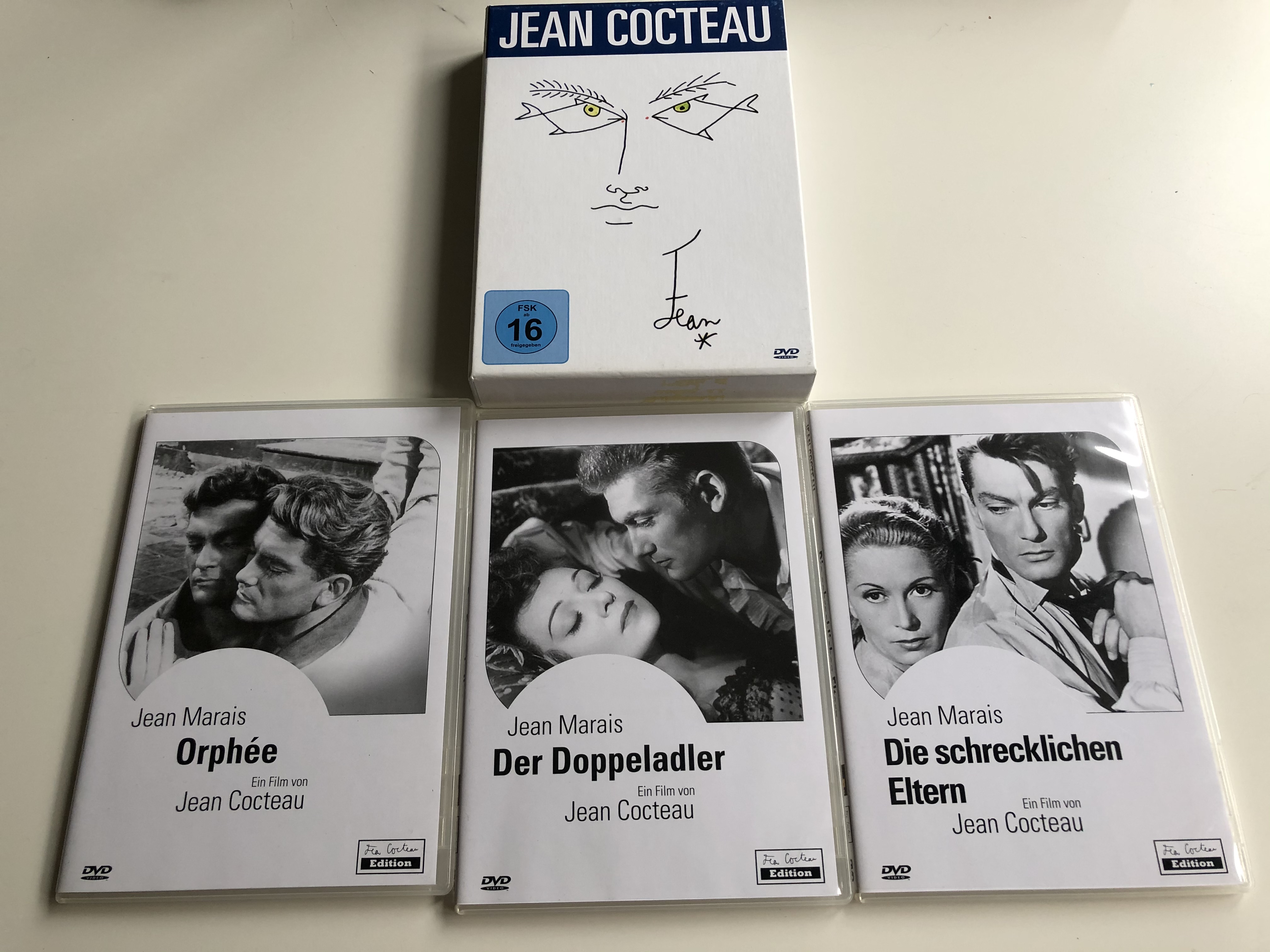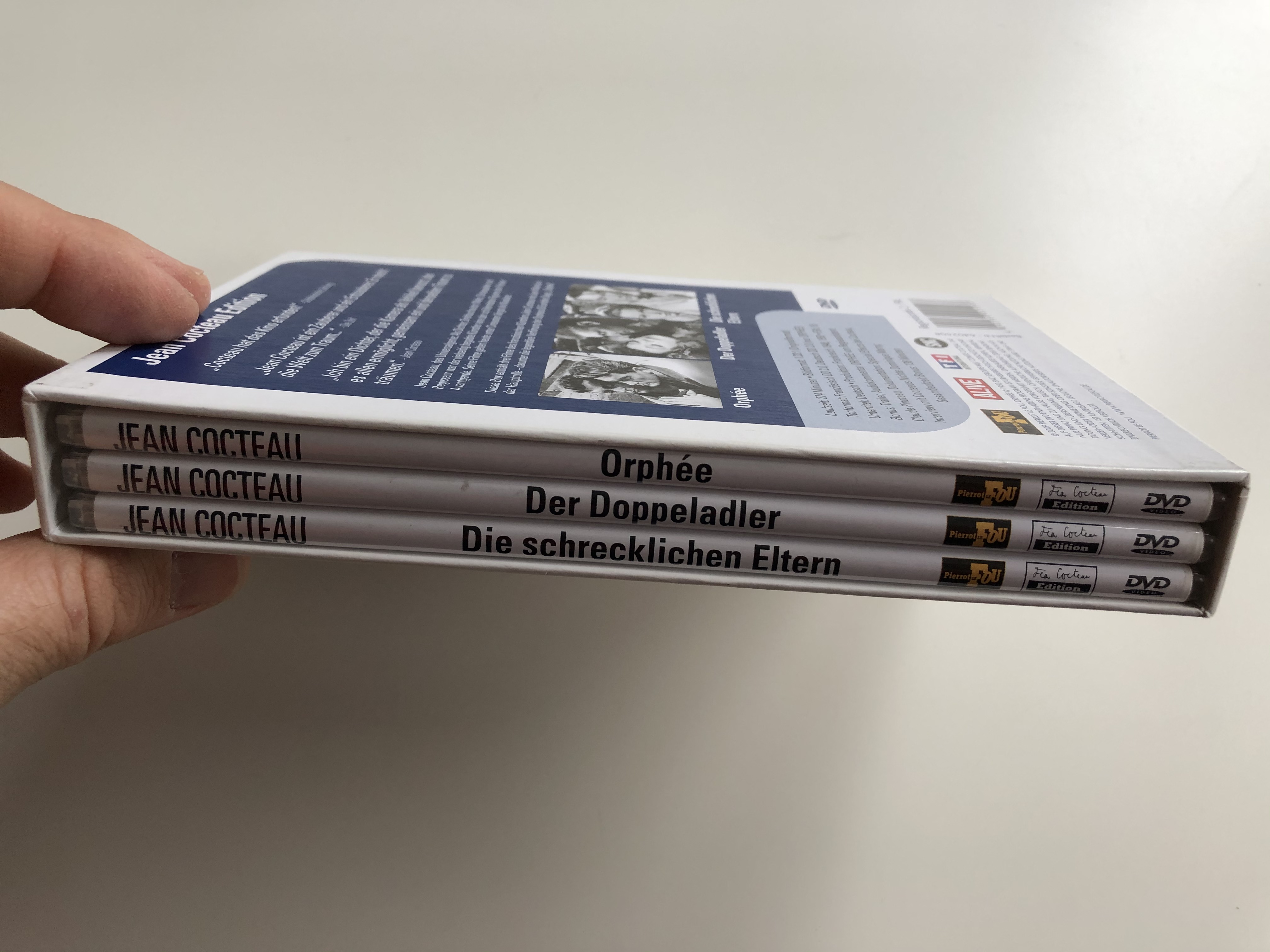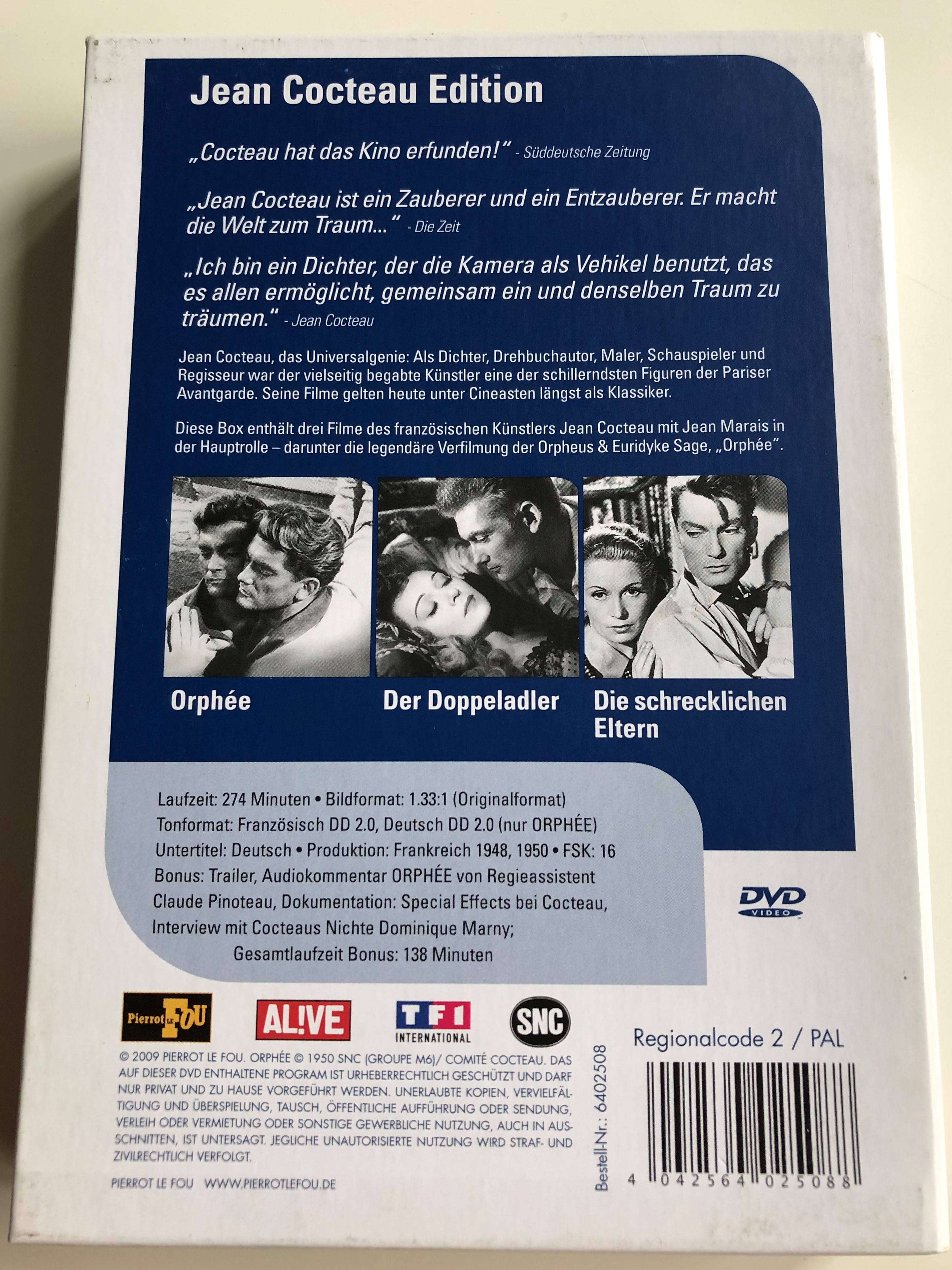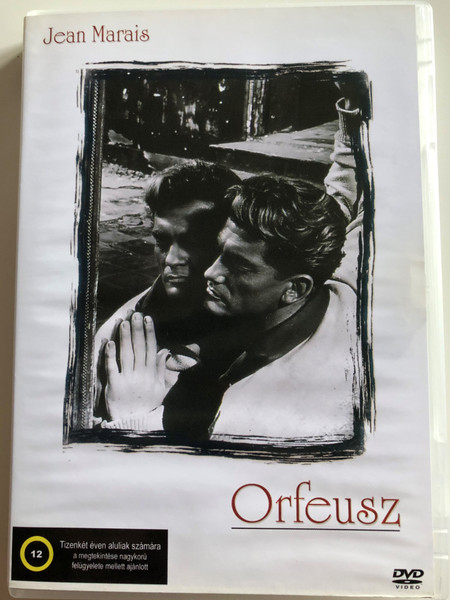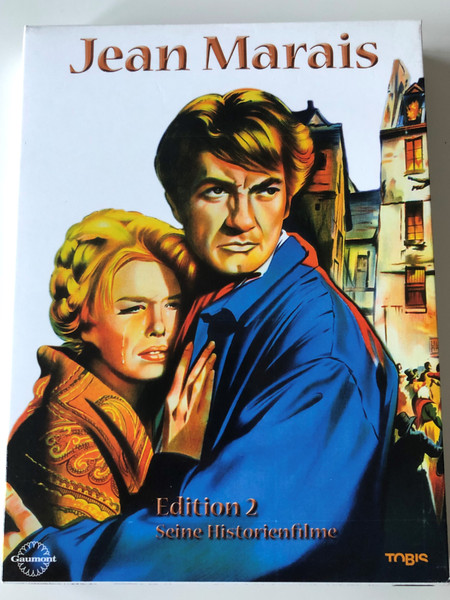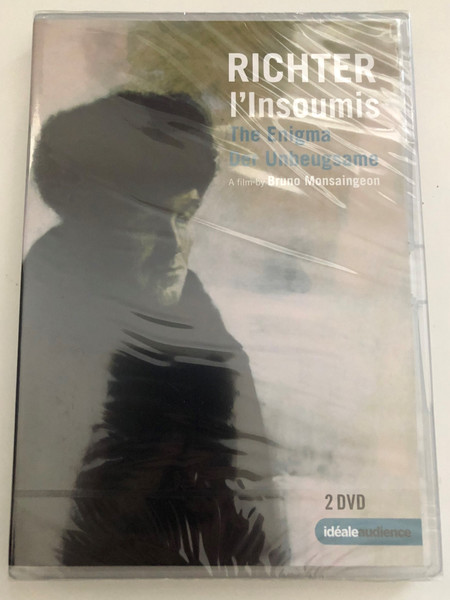Description
Jean Cocteau Edition DVD SET 2009 Orphée, Der Doppeladler, Die schrecklichen Eltern / German release Cocteau films 3x DVD / Orpheus, The Eagle with Two Heads, Les Parents terribles
UPC 4042564025088
MADE IN FRANCE
REGION 2 PAL DVD
AUDIO: French 2.0, German 2.0
SUBTITLES: German
!!! USED LIKE NEW !!!
TOTAL RUNTIME: 274 MINUTES (3 DISCS)
English Summary:
Orpheus (French: Orphée; also the title used in the UK) is a 1950 French film directed by Jean Cocteau and starring Jean Marais. It is the central part of Cocteau's Orphic Trilogy, which consists of The Blood of a Poet (1930), Orpheus (1950) and Testament of Orpheus (1960).
Set in contemporary Paris, the story of the film is a variation of the classic Greek myth of Orpheus. The picture begins with Orpheus (Marais), a famous poet, visiting the Café des Poètes. At the same time, a Princess (Casares) and Cégeste (Édouard Dermit), a handsome young poet whom she supports, arrive. The drunken Cégeste starts a brawl. When the police arrive and attempt to take Cégeste into custody, he breaks free and flees, only to be run down by two motorcycle riders. The Princess has the police place Cégeste into her car in order to "transport him to the hospital". She also orders Orpheus into the car in order to act as a witness. Once in the car, Orpheus discovers Cégeste is dead and that the Princess is not going to the hospital. Instead, they drive to a chateau (the landscape through the car windows is presented in negative) accompanied by the two motorcycle riders as abstract poetry plays on the radio. This takes the form of seemingly meaningless messages, like those broadcast to the French Resistance from London during the Occupation.
Cast / Distribution
- Jean Marais as Orphée
- François Périer as Heurtebise
- María Casares as The Princess – Death
- Marie Déa as Eurydice
- Henri Crémieux as L'éditeur
- Juliette Gréco as Aglaonice
- Roger Blin as The Poet
- Édouard Dermit as Jacques Cégeste
- René Worms as Judge
The Eagle with Two Heads (French title L'Aigle à deux têtes) is a French film directed by Jean Cocteau released in 1948. It was adapted from his own play L'Aigle à deux têtes which was first staged in 1946, and it retained the principal actors from the first Paris production.
On the 10th anniversary of the assassination of the king, his reclusive widow, the Queen, arrives to spend the night at the castle of Krantz. Stanislas, a young anarchist poet who seeks to assassinate her, enters her room, wounded; he looks exactly like the dead king, and the Queen shelters him instead of handing him over to the police. She sees him as the welcome embodiment of her own death, calling him Azrael (the angel of death). An ambiguous love develops between them, uniting them in a bid to outwit the machinations of the court politicians, represented by the Comte de Foëhn, the chief of police, and Édith de Berg, the Queen's companion. In order to remain true to their ideals and to each other, the Queen and Stanislas have to play their parts in a bizarre private tragedy, which the world will never understand.
Cast / Distribution / Besetzung:
- Edwige Feuillère as the Queen
- Jean Marais as Stanislas
- Silvia Monfort as Édith de Berg
- Jean Debucourt as Félix de Willenstein
- Jacques Varennes as Comte de Foëhn
- Ahmed Abdallah as Tony
- Yvonne de Bray as La présidente
Les Parents terribles is a 1948 film adaptation directed by Jean Cocteau from his own stage play Les Parents terribles. Cocteau used the same cast who had appeared in a successful stage revival of the play in Paris in 1946. The film has sometimes been known by the English title The Storm Within.
In a rambling apartment a middle-aged couple, Yvonne and Georges, live with their 22-year-old son Michel and Yvonne's spinster sister Léonie ("tante Léo"), who has also been in love with Georges. Yvonne is a reclusive semi-invalid, dependent on her insulin treatment, and intensely possessive of her son (who returns her immoderate affection and calls her "Sophie"); Georges distractedly pursues his eccentric inventions; it is left to Léo to preserve such order as she can in their life and their apartment, which she describes as a "gypsy caravan" ("la roulotte"). When Michel announces that he is in love with a girl, Madeleine, whom he wishes to introduce to them, his parents are immediately hostile and seek to forbid the relationship, reducing Michel to despair. Georges realises that Madeleine is the same woman who has been his own mistress in recent months, and he confesses all to Léo, who devises a plan to extricate father and son by forcing Madeleine into silent surrender of them both.
Cast / Distribution:
- Jean Marais : Michel
- Josette Day : Madeleine
- Yvonne de Bray : Yvonne ("Sophie")
- Marcel André : Georges
- Gabrielle Dorziat : Léonie ("Léo")
- Jean Cocteau (voice - uncredited) : Narrator
French Summary:
Orphée a voulu suivre sa femme qui vient d'être mordue par un serpent et Hadès lui a dit : si tu veux la retrouver il faudra qu'elle te suive hors des Enfers sans que tu te retournes. Orphée respecte cet ordre mais il finit par regarder en arrière au dernier moment et Eurydice disparaît à jamais.
Orphée est un poète reconnu. Un jour, alors qu'il est au café des poètes de sa ville, il voit arriver un jeune poète saoul, Cégeste, accompagné d'une femme élégante. Ce dernier provoque une bagarre générale dans le café, et lors de cette altercation générale, il se fait renverser par deux motards qui prennent la fuite. La femme (qui est la Princesse) fait transporter le jeune poète dans sa voiture et ordonne à Orphée de l'accompagner. Arrivé chez la Princesse, le jeune poète est mort. Son spectre se réveille, et reconnaît la Princesse comme étant sa propre mort. Il la suit à travers un miroir, pour passer dans l'autre monde.
L'Aigle à deux têtes est un film français de Jean Cocteau, adapté de sa pièce éponyme et sorti en 1948.
Trois jours d'un amour impossible pour une reine veuve, encore jeune et belle et pour un beau et vigoureux anarchiste qui, blessé, s'est réfugié dans le château de la reine, venu pour l’assassiner, alors que secrètement il l’a toujours aimée. La confrontation tragique entre « une reine d'esprit anarchiste et un anarchiste d'esprit royal », sosie du roi défunt.
Les Parents terribles est un film français réalisé par Jean Cocteau et sorti en 1948.
Dans un grand appartement parisien, où se côtoient le désordre d’un couple âgé et l’ordre de la tante Léonie, vieille fille, Michel est l’enfant choyé de cette étrange « roulotte » qui semble rouler à l’écart du monde. Yvonne idolâtre son fils jusqu'à en oublier son mari. Elle s’oublierait elle-même si elle ne devait pas s’occuper de son traitement à l’insuline…
Jean Maurice Eugène Clément Cocteau (UK: /ˈkɒktoʊ/, US: /kɒkˈtoʊ/, French: [ʒɑ̃ moʁis øʒɛn klemɑ̃ kɔkto]; 5 July 1889 – 11 October 1963) was a French poet, playwright, novelist, designer, filmmaker, visual artist and critic.













